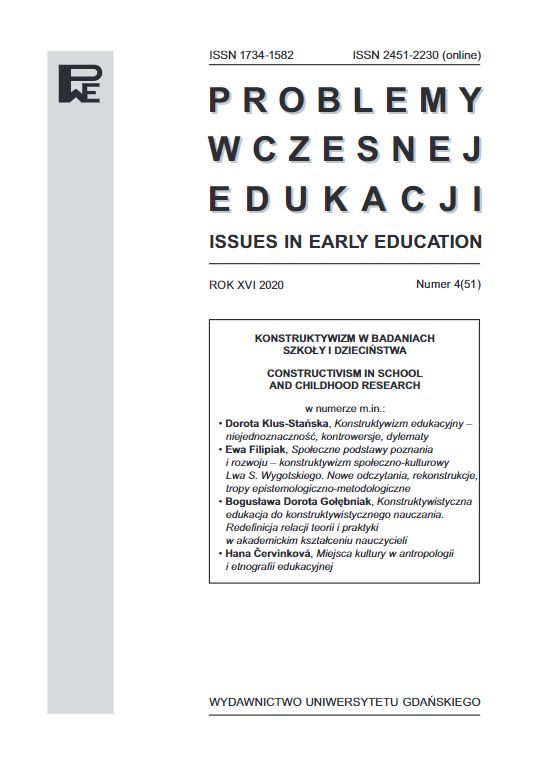Konstruktywistyczna perspektywa wczesnej edukacji przyrodniczej
DOI:
https://doi.org/10.26881/pwe.2020.51.08Słowa kluczowe:
wczesna edukacja przyrodnicza, konstruktywizm, procesy badawcze, edukacja outdoorowa, dociekania naukoweAbstrakt
This article reflects on how to use children’s natural curiosity in early science education and make learning a meaningful, joyful and useful experience for them. Therefore, an attempt was made to show the essence of the constructivist model of teaching natural science to the youngest students by referring to the strategy of teaching through inquiry and outdoor education.
Downloads
Bibliografia
Bednar A.K., Cunningham D.J., Duffy T.M., Perry J.D. (1992), Theory into practice: How do we link? W: Duffy T.M., Jonassen D.H. (eds.), Constructivism and the technology of instruction. Hillsdale, NJ, Lawrence Erlbaum Associates.
Bereiter C. (1994), Constructivism, Socioculturalism, and Popper’s World 3. „Educational Researcher”, 23(7).
Blair D. (2009), The child in the garden: an evaluative review of the benefits of school gardening. „Journal of Environmental Education”, 40(2).
Brown M. (2008), Comfort zone: model or metaphor? „Australian Journal of Outdoor Education”, 12(1). https://www.academia.edu/14271955/Comfort_Zone_Model_or_Metaphor, 12.06.2020.
Dahlberg G., Moss P., Pence A. (2007), Beyond quality in early childhood education and care. London, Routledge.
Fragkiadaki G., Fleer M., Ravanis K. (2019), A cultural-historical study of the development of children’s scientific thinking about clouds in everyday life. „Research in Science Education”, 49(6). https://www.sciencedirect.com/science/article/pii/S221065612030132X?dgcid=author, 20.09.2020.
Jonassen D.H. (1994), Toward a Constructivist Design Model. „Educational Technology”, 34(4).
Kuo F.E., Taylor A.F. (2004), A Potential Natural Treatment for Attention Deficit/Hyperactivity Disorder: Evidence from a National Study. „American Journal of Public Health”, 94(9). https://www.researchgate.net/publication/8379683_A_Potential_Natural_Treatment_for_Attention-DeficitHyperactivity_Disorder_Evidence_From_a_National_Study#fullTextFileContent, 29.09.2020.
Lorsbach A.W., Tobin K. (1992), Constructivism as a referent for science teaching. W: Lorenz F., Cochran K., Krajcik J., Simpson P. (eds.), Research Matters… to the Science Teacher. Manhattan, KS, National Association for Research in Science Teaching.
Louv R. (2010), Last Child in the Woods: Saving our Children from Nature-Deficit Disorder. London, Atlantic Books.
Martin D.J., Jean-Sigur R., Schmidt E. (2005), Process-Oriented Inquiry – A Constructivist Approach to Early Childhood Science Education: Teaching Teachers to Do Science. „Journal of Elementary Science Education”, 17(2).
Maynard T., Waters J. (2007), Learning in the outdoor environment: A missed opportunity. Early Years. „An International Journal of Research and Development”, 27(3).
Melhuus L.C. (2012), Outdoor day-care centers – acculturalization of nature: how do children relate to nature as educational practice? „European Early Childhood Education Research Journal”, 20.
Metz K. (1995), Reassessment of developmental constraints on children’s science instruction. „Review of Educational Research”, 65.
Michalak R. (2011), Poznawanie świata przyrody jako kontekst rozwoju kompetencji poznawczych trzecioklasistów. W: Sowińska H. (red.), Dziecko w szkolnej rzeczywistości. Założony a rzeczywisty obraz edukacji elementarnej. Poznań, Wydawnictwo Naukowe Uniwersytetu im. Adama Mickiewicza.
Michalak R. (2013), Dziecko u progu edukacji przedmiotowej. Studium teoretyczno-empiryczne. Poznań, Wydawnictwo Naukowe Uniwersytetu im. Adama Mickiewicza.
Michalak R., Parczewska T. (2019), (Nie)obecność outdoor education w kształceniu szkolnym. Lublin, Wydawnictwo Uniwersytetu Marii Curie-Skłodowskiej.
Mitchell P. (2018), What is outdoor education? W: I. Lisin, P. Kida (eds.), Outdoor education from theory to practice. Wrocław, Foundation Institute of Animation and Social Development.
Niklasson L., Sandberg A. (2010), Children and the outdoor environment. „European Early Childhood Education Research Journal”, 18(4).
Oliver K.M. (2000), Methods for developing constructivism learning on the web. „Educational Technology”, 40(6). https://www.jstor.org/stable/44428633?seq=1#metadata_info_tab_contents, 26.09.2020.
Olusegun S. (2015), Constructivism Learning Theory: A Paradigm for Teaching and Learning. „IOSR Journal of Research & Method in Education”, 5(6). http://iosrjournals.org/iosr-jrme/papers/Vol-5%20Issue-6/Version-1/I05616670.pdf, 29.09.2020.
Petlak E., Zajacová J. (2010), Rola mózgu w uczeniu się. Kraków, Wydawnictwo PETRUS.
Piaget J. (1964), Development and learning. „Journal of Research in Science Teaching”, 2(3). https://onlinelibrary.wiley.com/doi/epdf/10.1002/tea.3660020306, 1.10.2020.
Prince H.E. (2018), Changes in outdoor learning in primary schools in England, 1995 and 2017:,lessons for good practice. „Journal of Adventure Education and Outdoor Learning”, 19.
Ravanis K. (2017), Early childhood science education: State of the art and perspectives. „Journal of Baltic Science Education”, 16(3).
Smith P.K. (2010), Children and Play. Chichester, Wiley-Blackwell.
Tam M. (2000), Constructivism, Instructional Design, and Technology: Implications for Transforming Distance Learning. „Educational Technology and Society”, 3(2). https://www.researchgate.net/publication/26391080_Constructivism_Instructional_Design_and_Technology_Implications_for_Transforming_Distance_Learning, 25.09.2020.
Taylor A.F., Kuo F.E., Sullivan W.C. (2002), Views of Nature and Self-Discipline: Evidence from Inner City Children. „Journal of Environmental Psychology”, 22(1–2). https://doi.org/10.1006/jevp.2001.0241, 15.10.2018.
Tuuling L., Õun T., Ugaste A. (2018), Teachers’ opinions on utilizing outdoor learning in the preschools of Estonia. „Journal of Adventure Education and Outdoor Learning”, 19(4). https://www.researchgate.net/publication/329446170_Teachers%27_opinions_on_utilizing_outdoor_learning_in_the_preschools_of_Estonia, 12.03.2020.
Tytler R., Peterson S. (2004), From “Try it and see” to strategic exploration: Characterizing young children’s scientific reasoning. „Journal of Research in Science Teaching”, 41(1).
von Glasersfeld E. (1995), A constructivist approach to teaching. W: L.P. Steffe, J. Gale (eds.), Constructivism in education. Hillsdale, NJ, Lawrence Erlbaum Associates.
Waite S. (2011), Teaching and learning outside the classroom: Personal values, alternative pedagogies and standards. „Education 3–13”, 39(1).
Wattchow B., Brown M. (2011), A Pedagogy of Place. Melbourne, Monash University Publishing.
Wells N.M. (2000), At Home with Nature: Effects of ‘Greenness’ on Children’s Cognitive Functioning. „Environment and Behavior”, 32(6).
Wells N.M., Evans G.W. (2003), Nearby Nature: A Buffer of Life Stress Among Rural Children. „Environment and Behavior”, 35(3).

 Uniwersyteckie Czasopisma Naukowe
Uniwersyteckie Czasopisma Naukowe





